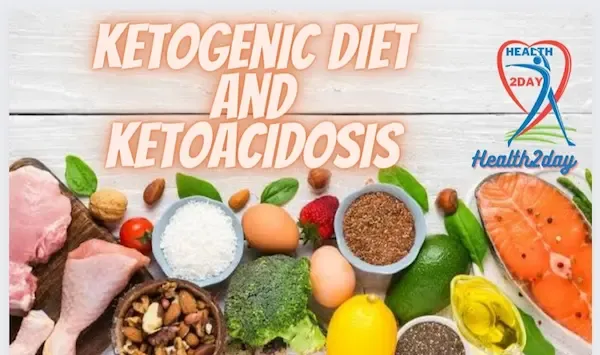In the current media coverage of the ketogenic diet, weight reduction and greater energy have been touted as the primary health advantages. As a result of this diet, individuals are able to achieve a state of ketosis without developing metabolic issues or sickness until they are subjected to particular conditions, such as stress or extended fasting.
Ketosis and Ketoacidosis, despite their similar names, are two distinct conditions. In order to better understand them, let's take a closer look at each one.
Can a keto diet cause ketoacidosis?
Diabetic ketoacidosis: what exactly is it?
Type 1 diabetes and, to a much lesser extent, type 2 diabetes, are both predisposed to diabetic ketoacidosis (DKA). DKA occurs when the body's acidic ketones accumulate to harmful amounts due to excessive blood sugar.
If you're suffering from ketoacidosis, don't mistake it with ketosis, which is safe. Fasting or a very low-carbohydrate diet, known as a ketogenic diet, may both lead to ketosis.
DKA can only occur if your body lacks sufficient insulin to convert blood sugar into energy. Ketones are released into the bloodstream when your liver begins to digest fat for energy. People who have high amounts of ketones in their blood should avoid doing so.
Type 2 diabetics are less likely to experience this since their insulin levels are not as low, although it is possible. It is possible that DKA is the initial symptom of type 1 diabetes, as sufferers are unable to produce their own insulin.
Can keto cause metabolic acidosis?
Difference and similarity between glycolysis and ketosis
Both glycolysis and ketosis are common metabolic processes in the human body. Fats stored in the body are used for energy when there are not enough carbs available in the diet.
In the process of glycolysis, glucose is produced in the body and subsequently circulated throughout the body. Glucose may be converted into glycogen if your blood sugar and energy levels are high.
You may save glycogen in your muscles and liver to utilize it at a future time.A lack of carbohydrates causes the body to begin converting glycogen back into glucose when blood glucose levels are low.
Glycogen reserves begin to deplete as a result of ketosis, so what occurs when this happens? In the absence of glucose, your body must use ketone bodies as an energy source.
Ketones are constantly being produced by our bodies in minute quantities. This is not the case when you are not in the state of ketosis. This fat is either ingested or has already been stored in your body.
Ketones, unlike glucose, are not kept and are instead excreted as waste. They are expelled from the body by the kidneys, which remove them from the blood.
When you're in Ketosis, what foods can you eat?
Eating a diet rich in whole foods such as lean meats and fish, low-carb vegetables and low-carb flours made from sustainably farmed natural ingredients is the best way to lose weight (almond, chickpea, etc.).
You can't consume any processed or refined foods when on a ketogenic diet. When it comes to weight loss results, the ketogenic diet stands head and shoulders above the competition.
Besides reducing malignant tumors' threat, it has also been shown to cure cognitive impairments including Alzheimer's disease and depression, as well as regulate diabetes and insulin levels.
What's the difference between ketosis and ketoacidosis?
Ketosis:
A ketogenic diet, or "keto" diet, is a low-carbohydrate diet that encourages the body to burn fat instead of glucose. There is a possibility that ketosis might induce foul breath.
acetone is one of the byproducts of the breakdown of ketones to be used as fuel, and it may be found in the urine and breath of people who are experiencing ketoacidosis.
Ketosis may be exacerbated by a low-carbohydrate diet. For example, this might be used as a weight-loss method. Ketosis may be more common in those on restricted diets for eating disorders.
A common consequence of type 1 diabetes is ketoacidosis, a condition in which the body creates dangerously excessive quantities of the ketone. Type 1 diabetes may lead to ketoacidosis, which is a consequence of the disease.
Ketoacidosis
Ketoacidosis is a potentially fatal illness caused by abnormally high quantities of ketones and glucose in the blood. It may alter the functioning of your internal organs like your liver and kidneys if you have this combination in your blood.
It would be beneficial if you received medical attention as soon as possible. Aside from the above-mentioned symptoms, people with ketoacidosis may also experience disorientation, confusion, and a strong need to urinate often.
Diabetic ketoacidosis symptoms include:
•abnormally high amounts of blood sugar.
•increases in urine ketones.
frequent urination due to excessive thirst.
•exhaustion
Skin that is flaky, dry, or flushed
What can be done to avoid Ketoacidosis?
Ketoacidosis danger factors:
Under extreme circumstances, this ketosis may progress to overt ketoacidosis, resulting in a drop in pH and serum bicarbonate levels, which can be life-threatening and need hospitalization.
It's important to remember that hunger, especially in those on low-carbohydrate, low-calorie diets, may cause ketoacidosis, even though these are the most common causes.
Ketoacidosis may occur as a consequence of famine, malnutrition, or poor food intake.Starvation ketoacidosis has also been linked to gastric banding.
In addition to ketoacidosis, electrolyte imbalances, hypoglycemia, severe pancreatitis, and dyslipidemia are all possible adverse effects of the ketogenic diet.
You should be:
•Checking blood glucose levels regularly and informing a doctor if they are not under control helps lower the risk of Ketoacidosis in diabetics.
•Checking for ketones in the urine if blood glucose levels are more than 240 mg/dl.
•If ketones are present in the urine and blood glucose levels are high, exercising should be avoided unless insulin is prescribed by a doctor.
•Maintaining a nutritious and balanced diet, and not missing meals.
•Generally speaking, ketosis is not harmful. The majority of the time, this is the result of either a temporary dietary ailment or a deliberate, low-carbohydrate diet.
•Your doctor will want to reassess your diet and insulin management plan once you've recovered from diabetic ketoacidosis. Keep an eye on your blood sugar levels and know what to do if they start to go out of control. If you have any questions, make an appointment to see your doctor.
How do you avoid ketoacidosis while on a keto diet?
Ketoacidosis may be prevented
Diabetes patients may lower their risk of ketoacidosis by following the following tips:
•frequently checking blood glucose levels and informing a physician if they are not under control.
•If blood glucose levels are over 240 mg/dl, a urine ketone test should be performed.
•When ketones are present in the urine and blood glucose levels are high, it is best to avoid exercising.
•following the doctor's prescribed insulin dosage.
•Avoiding food deprivation by following a well-rounded diet.
What is the most common cause of ketoacidosis?
Diabetes ketoacidosis may be caused by a variety of factors.
When insulin levels drop, diabetic ketoacidosis (DKA) ensues. To make utilization of the glucose in our blood, our bodies rely on insulin. DKA causes high blood sugar levels because glucose cannot enter the cells.
Fat is broken down into a fuel that doesn't need insulin as a result. Ketones are produced when fat is burned for energy. Over Producing ketones causes your blood to become more acidic, which may lead to dehydration. Defining symptoms of diabetic ketoacidosis
DKA may be brought on by any of the following:
•disease or infection as a result of not injecting enough insulin.
•Your insulin pump may have a blockage, if you use one.
Is it possible to cure ketoacidosis?
As a health issue, Diabetic Ketoacidosis is fast-moving and very curable.
Diabetic ketoacidosis is often treated at a clinic or trauma center by medical professionals. In most cases, insulin and fluid and electrolyte replacement are part of the therapy plan.
The great majority of people who develop diabetic ketoacidosis should be monitored in the hospital's emergency room. The expert may order further tests to see whether the patient has other risk factors for Ketoacidosis when blood ketone levels return to normal.
Can ketosis lead to ketoacidosis? Feed
Q: Has anybody ever experienced Ketoacidosis while on the ketogenic diet?
Deficiency of insulin results in diabetic ketoacidosis. As a result, diabetic ketoacidosis may occur if an insulin-dependent diabetic fails to take the recommended amount of insulin. So the issue isn't with the keto diet per se, but rather with the inability to adequately inform those with insulin deficiency about the dangers of not taking their medications as prescribed.
Sources:
• Answer to Can a keto diet cause diabetic ketoacidosis? by Jonathan Christie




